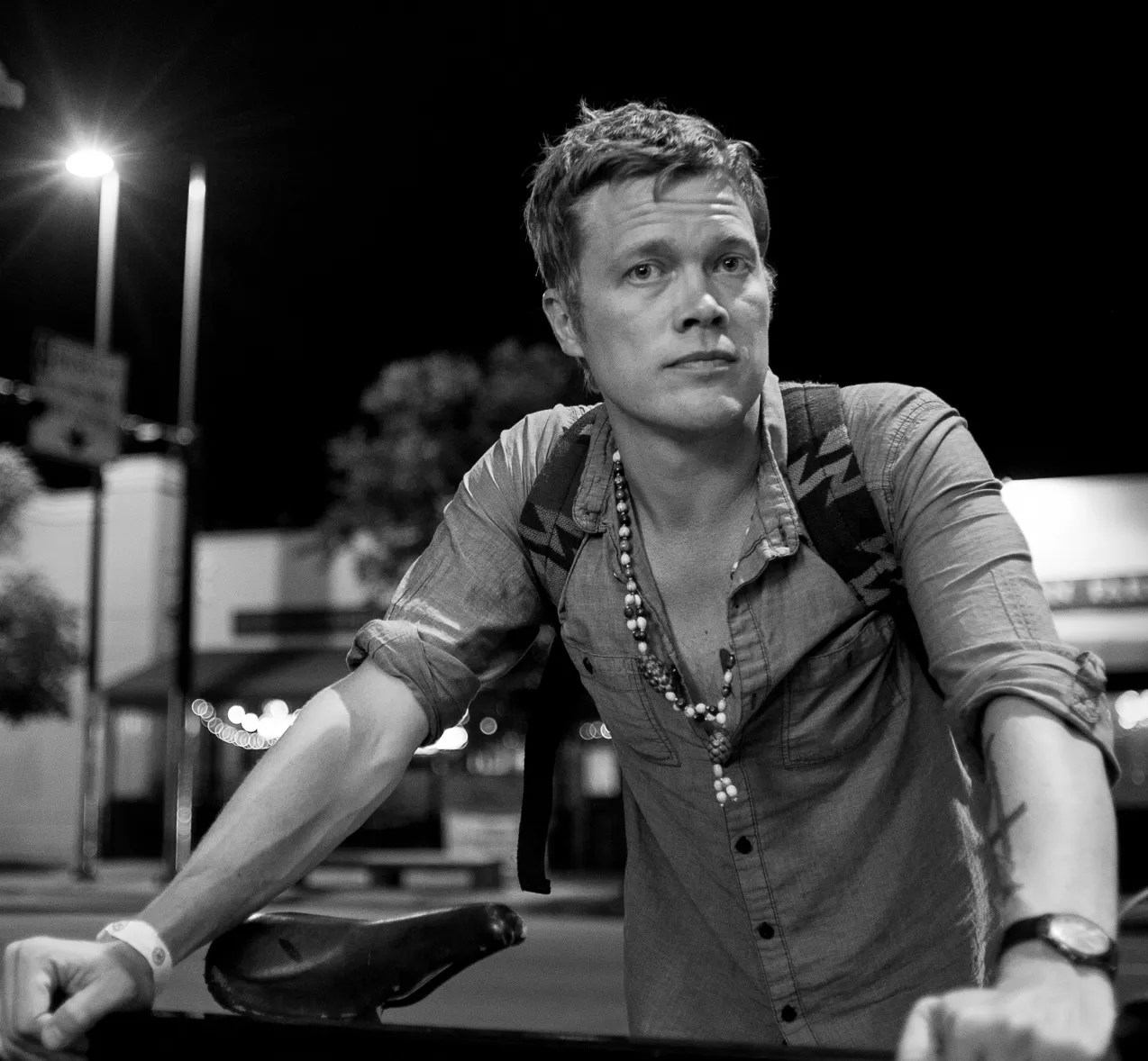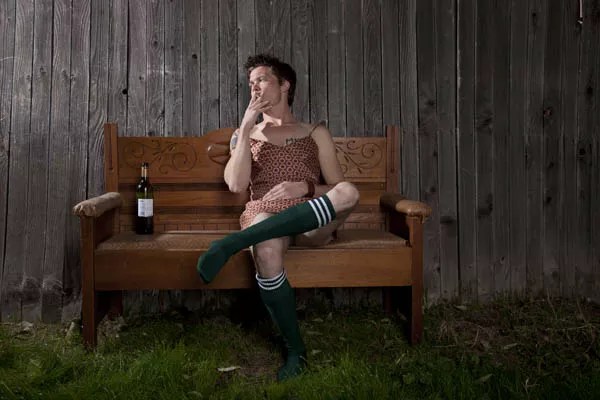
Glenn Ross

Audio By Carbonatix
Josiah Hesse has been called a lot of things. Freelance journalist. Editor-in-chief. Author. Pop-culture critic. Colorado Creative. And, one may imagine, a lot of other colorful possibilities, especially when he’s taking a jab at cultural phenomenon like Denver’s cruiser-bike culture for this very publication, back in 2012. An outspoken commentator on local art, music, literature, and all things Denver, Hesse is back again, with part two of his ongoing Carnality opus, with more historical fiction, more psychological horror, more self-revelation, and more Evangelical-nightmare fuel.
Hesse agreed to talk with us about the launch of Carnality: Sebastian Phoenix and the Dark Star; his literary venture Suspect Press (which just received $125,000 in support from the Santa Fe art project Meow Wolf), cruiser bikes, artistic Jedi, and how his devotion to the Mile High City fits into it all.
Westword: You have a book launch happening at the Tattered Cover on Friday night, August 3. Tell us a little about what to expect.
Josiah Hesse: Most literature readings are a bit drab and need to be tarted up a bit. Like with the magazine, with our shows we like to blend a variety of artistic mediums into one soup. There will definitely be literature readings, but we’ll also have live music from Adam Baumeister and Esmé Patterson scoring them. And we’re going to have a large-scale theatrical music act closing out the show – but we want to keep their identity a secret until showtime. A lot of us will be in makeup and costume – a kind of pagan-mythology-meets-cyber-punk theme. Christie Buchele is a whip-smart Denver comic, and she’s hosting the show. To my knowledge, this will be the first time the Tattered Cover Colfax building will revive its history as a theater venue.
So why an adults-only party at the Tattered Cover instead of, say, at Ratio [brewery]? Who’s supplying the beer, anyway?
There are a few reasons for the 21+ caveat. First off, the content of the Carnality books ventures at times into the realm of erotica, and I don’t enjoy reading sexy content to underage kids. Also, since we’re serving alcohol, and Tattered Cover has never attempted anything like this, we’re keeping it 21+ for logistical reasons.
Why not have the party somewhere else? Well, Tattered Cover is a very iconic place for me, since it was pretty much my primary resource for education, along with public libraries. I’m a high school dropout who never went to college, and when I first moved to Denver, I spent all my free time at Tattered Cover, reading magazines from around the world and all the subversive literature I could get my hands on.
Speaking of subversive…how was Carnality‘s first book, Dancing on Red Lake, received?
Very well. It was a humble release when it came out in 2015. At that time, I knew nothing of the “exvangelical” movement and had little sense that there were people like me who were traumatized by Christianity as children. I also didn’t anticipate that so many people who knew nothing of Christian rock or televangelism would be so excited to read a psychological horror novel about that world. But the books kept selling, so that gave us a lot of wind in our sails.

Carnality: Sebastian Phoenix and the Dark Star
Cover Art: Lonnie Allen
And how does part 2 of the Carnality series, Sebastian Phoenix and the Dark Star, continue the story of the strange world of Evangelicals?
In the first book, we mainly dealt with the Jesus Movement of the ’70s – a time when disaffected hippies turned to fundamentalist Christianity and doomsday prophecy, but kept the bellbottoms of jangly rock music of the counterculture (thereby inventing Christian rock). With this book, we deal with the Satanic panic, homophobia and anti-drug hysteria of the ’90s, which was a really fun environment to play in. It’s essentially the story of an anti-gay, evangelical teen pop star who discovers his own queer sexuality as he’s preaching against such behavior. I’m endlessly fascinated by the sexual tension of Christian rock, a world where young people are inundated with sexually provocative images that mirror the secular world, yet are commanded to remain chaste and never [be] worldly.
You’ve said in other interviews that a lot of the inspiration for Carnality as a series is drawn – or at least inspired – by your own evangelical upbringing. Is that still true for part two? What specific memories or experiences are working their way into this next iteration?
This book is even more autobiographical than the first one. Jacob Sloan is profoundly idealistic about his Christianity, primarily because he’s terrified of being tortured for all eternity in Hell – something I spent nearly every second of my youth concerned with. He’s confused about how to avoid Hell, and is constantly paranoid about accidentally condemning himself just by thinking the wrong thought. The one thing he knows is that entrance to Heaven is dependent on belief, so he guards his beliefs aggressively. His rational mind is a threat to that belief, so he learns to shut that shit down. People like to use the book 1984 as the ultimate example of dystopian oppression, but in that world, it was only cameras you had to avoid. When you’re a young fundamentalist Christian, it’s your own thoughts you have to vigilantly navigate.
This headfuck reaches its zenith when you’re a sexually blossoming teenager. Especially when you’re queer, and even more so when you’re queer and surrounded by sexually repressed, closeted gay men. In the evangelical world, you’re taught that demons surround us at all times, tempting us with sin, with the aim of getting us into Hell. So in that dynamic, you interpret every hormonal tic as a demon in your body, attempting to control your thoughts and behavior. And when people in positions of power reveal their dark impulses to you (expectantly), it’s quite disillusioning.
What about other literary works? Any authors you’d like to think echo through the book, at least a little, in terms of influence?
It’s embarrassing how much of the structure and character development in Carnality is influenced by Stephen King. He’s not taken very seriously in the literary world, but I’ve always been in awe of his ability to make a reader fall in love with a character and then scare the shit out of them with what happens to that character.
JT LeRoy’s style of using a naive child to narrate a story was a big influence on me with Carnality. I love it when the reader knows more about what’s going on in the story than the narrator. Which plays well when you’re dealing with a teenager contending with his own sexuality inside the world of evangelical repression.
Also, Educated, by Tara Westover, is a phenomenal memoir about growing up in fundamentalist Mormonism in rural Idaho. I’d already written Carnality by the time I read it, but there was an amazing amount of crossover.
You’ve mentioned John Cale and the Patti Smith Group in composing the soundtrack for Carnality – but assuming that they’re not available, what existing songs and artists would you want to license?
I’m very excited to work with Adam Baumeister and Esmé Patterson at the show. Adam and I have had a blast mixing literature and live music in the past, and Esmé is probably one of my favorite songwriters ever. But if we’re talking ultimate fantasy league, I’d love to work with Fiona Apple, Scott Walker, Jenny Lewis, Jon Brion or Stuart Murdoch (Belle & Sebastian) on some literary/music collaboration.

Josiah Hesse
Crystal Allen
So have you softened at all on the subject of cruiser bikes in the last six years? Have you learned to swim or managed to stop having nightmares? Any new goals?
The cruiser-bike thing was petty and juvenile. For a few of my years at Westword, I had a real sociopathic bug up my ass, always wanting to pick on beloved social institutions (Christmas, voting, clean comedy) in editorials that would irk a lot of people. In my twenties, my heroes were Andy Kaufman, Morrissey and Hunter Thompson, so I was under the misguided illusion that being an asshole was charming.
No, I still haven’t learned to swim. I’d just as soon jump headfirst into a pool of rabid badgers as a pool of water, as both seem equally terrifying. And writing the Carnality books has actually been quite therapeutic for the nightmares. I still have terrifying dreams, but I can at least move around and fight back these days.
Talk a little bit about Suspect Press. What are you most proud of presenting to the Denver zine scene recently?
I’m proud of the chances we’ve taken on subversive and provocative content in a free magazine. Suspect editor-in-chief Amanda EK has been so courageous writing about her experiences in Christian purity culture and sexual harassment, and composing profoundly dark short stories about lonely people engaging in dangerous behavior.
Our art director, Lonnie Allen, has done a fantastic job curating the comics section of the paper, bringing in a whole culture and pool of talent I was mostly ignorant of. It’s been so much fun integrating the poetry, comedy, literature, art and comics scenes all together in the same publication.
Though just as much as I’m proud of our artistic achievements, I get super-duper stoked to hand out checks to our contributors. It’s nothing they can live on, but it’s a thrill participating in the arts economy, facilitating in some small way artists being able to live on their art. Whenever we engage in the business end of Suspect Press (getting new advertisers, negotiating prices with a printer), it’s our artists’ pocketbooks we have in mind. It’s the arts economy of Denver – particularly underground artists – that we’re doing this for.
So in that arts economy, you’re on record as saying that given unlimited funds, you’d put together a Jedi Council of your “favorite writers, musicians, filmmakers, comedians, illustrators, businesspeople and carpenters in the Denver area.” Let’s name some names here, assuming that you’re the Yoda. Who are the Denver Jedi you surround yourself with for that enclave (doomed as it may be to your own ego- and ketamine-driven Order 66)?
Fortunately, this doesn’t have to be in the realm of fantasy, as working with my favorite Denver artists is what running Suspect Press is all about.
Unfortunately, the money we raise with advertising doesn’t come close to paying the Suspect Press contributors what they’re worth – though we’re about to facilitate a number of creative and marketing projects for Meow Wolf through Suspect Press, which will give us the opportunity to put a lot of our favorite Denver artists to work on exciting projects.
What’s the one part of Denver that you consider indispensable to the city as an artistic community? In terms of art and literature, what’s Denver’s biggest selling point?
I love giving visitors a tour of South Broadway, popping into Mutiny, Lowbrow, Fancy Tiger, Remixed Gifts, Syntax. And, of course, 13th Avenue in Capitol Hill, with Wax Trax, Kilgore Books, City, O’ City. All of these retailers carry products made by Denver artists. They put up the posters, stock the books or records, host the shows. It’s where you sell your shit and meet people you fall in love with.
It’s our quality of talent and our regional arts economy that I always point to when bragging about our city.
Carnality Book Release Party with Josiah Hesse, 9:30 p.m. Friday, August 3, Tattered Cover, 2526 East Colfax Avenue, $15-$17.